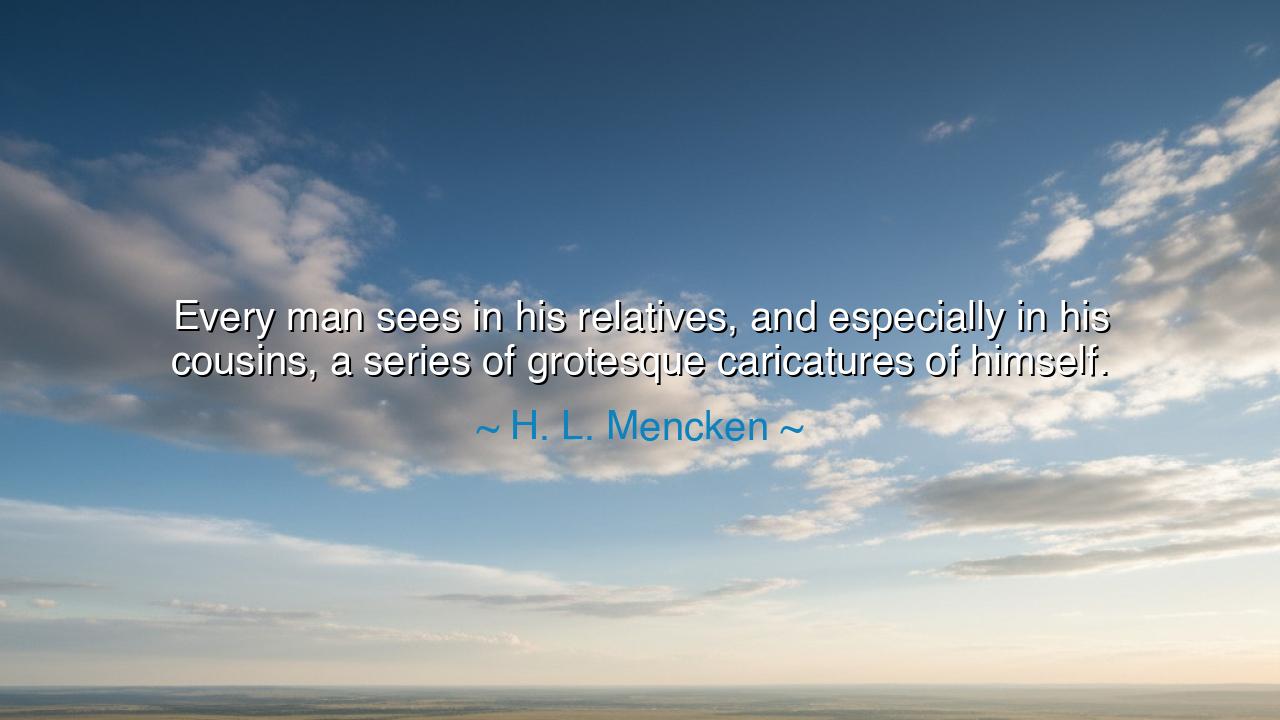
Every man sees in his relatives, and especially in his cousins
Every man sees in his relatives, and especially in his cousins, a series of grotesque caricatures of himself.






The sage H. L. Mencken once declared: “Every man sees in his relatives, and especially in his cousins, a series of grotesque caricatures of himself.” In these words there lies a piercing truth, for blood ties are mirrors that do not flatter, but rather distort and magnify. The family is not only a sanctuary of love and duty; it is also a stage where one sees the exaggerations of one’s own nature acted out by others, sometimes comically, sometimes painfully.
Mencken, master of irony, knew that kinship binds not merely by affection but also by reflection. When we behold our cousins, we glimpse familiar gestures, temperaments, and follies—yet refracted through another soul. Each quirk of theirs recalls a hidden aspect of our own being, stretched and twisted until it appears almost monstrous. Thus, we recoil, not from them, but from the shadow of ourselves that they unknowingly parade before us.
Consider the banquet of the clan: the boastful uncle, the timid aunt, the wayward cousin. Each of these is a fragment of the same ancestral clay, molded into a slightly different form. And yet, each bears the same ancestral stamp, the same ancient echo, so that their flaws awaken in us an uneasy recognition. For who has not seen in his kin the pride, the cowardice, or the folly that lurks dormant in himself?
This saying is no counsel of despair but of wisdom. To see one’s family as grotesque caricatures is to be reminded of the raw stuff of human nature. It teaches humility, for none may escape the mirror of blood. It teaches compassion, for if their failings are but distorted images of our own, then judgment softens, and laughter becomes kinder.
Therefore, let the youth remember: when you look upon your kin and shudder at their eccentricities, do not mock too harshly. They are but fragments of the same soul scattered across generations. What you scorn in them may awaken in you tomorrow. And so, in this shared distortion, there lies not only comedy, but also a bond deeper than pride—an eternal reminder of the kinship of imperfection.






MNdo ngoc minh nhi
This quote makes me think of how we sometimes judge others in our family, especially cousins, as a way of distancing ourselves from our own characteristics we might not like. It’s interesting that Mencken uses 'grotesque caricatures'—could this be a way of highlighting how exaggerated our perceptions are of the things we don’t like in ourselves? Do you think this happens because we subconsciously fear becoming 'just like' them?
AVNGOC ANH Vu
I find this quote amusing, but it also makes me wonder: is Mencken pointing to something deeper about family dynamics and self-perception? Are we all just mirrors of our relatives, reflecting back our best and worst traits? Or do we actually see the exaggerations of what we dislike in ourselves when we look at them? Do our cousins serve as a reminder of our own flaws and insecurities?
PAduong ha phuong anh
Mencken's statement strikes me as harsh but also quite true in some cases. I’ve noticed that sometimes we view our relatives, particularly cousins, through a lens of comparison. Maybe it’s because we’re all trying to make sense of who we are in relation to others. Could it be that this 'grotesque caricature' is just a form of self-awareness, a way to understand our own identity through the eyes of family?
Nnguyentrunganh
I can understand where Mencken is coming from, but I'm not sure I fully agree. Sure, relatives, especially cousins, can sometimes seem exaggerated versions of ourselves, but isn't that just part of family dynamics? Families often amplify traits, both good and bad, but doesn't that also make them interesting? What do you think—are our cousins just reflections of ourselves, or do they shape who we are?